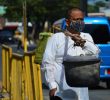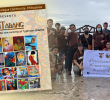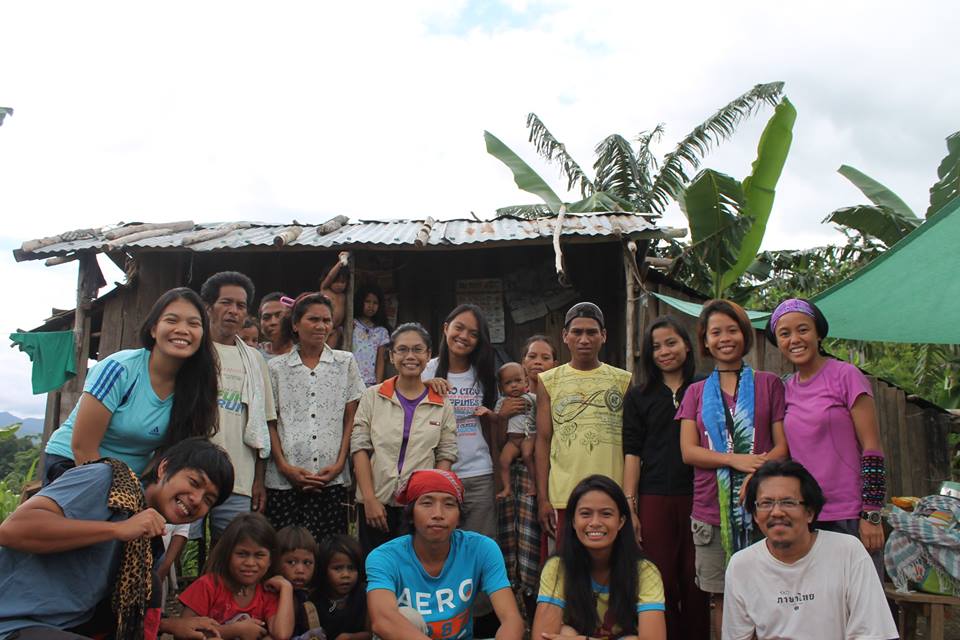
Myfel Paluga first from right, seated, Aya Ragragio behind him, third from right standing is Rose. (Standing) Geallaika first from left, Karen fourth from left, Petal fifth from left. With the other members of the Talaingod Manobo bakwit documentation team, 5 May 2014, Sitio Bagang, Brgy. Palma Gil, Talaingod. (contributed photo)
By the University of the Philippines Mindanao Anthropology Department
Andrea Malaya M. Ragragio, MJ Paluga, Petal Cagape, Karen Joyanne Chua, Geallaika Delideli, Rose Marry Tranquilan
One of the main destinations of this week’s national fact-finding and solidarity mission (NFFSM) to investigate human rights violations was the municipality of Talaingod, Davao del Norte, which has been in the news lately with the evacuation of more than a thousand of its Manobo residents after the start of massive military operations in late March. More than 900 of them eventually found refuge in Davao City, where they stayed for a month until an agreement to remove military presence in their villages was reached in a dialogue facilitated by Davao City Mayor Rodrigo Duterte and Davao del Norte Governor Rodolfo del Rosario. They have since returned to their homes, but their recovery is just beginning, and its completion by no means certain.
While the Manobos were here at the at the United Church of Christ in the Philippines Haran compound, our team of anthropology teachers and students from the University of the Philippines-Mindanao decided to lend an anthropological hand (and eye, and ear, and everything else) by applying the methods and perspectives of our discipline in helping find short- and long-term solutions to their predicament.
In the process, we discovered that one of the best ways to foster understanding between these people, embattled as they were, and the other players such as support groups, members of the press, government officials and others was to let them use their own words in expressing their own sentiments.
We therefore sought to record and transcribe occasions wherein the Talaingod Manobos had free reign over their own words, and the significance of the panubad-tubad as such an opportunity cannot be underestimated.
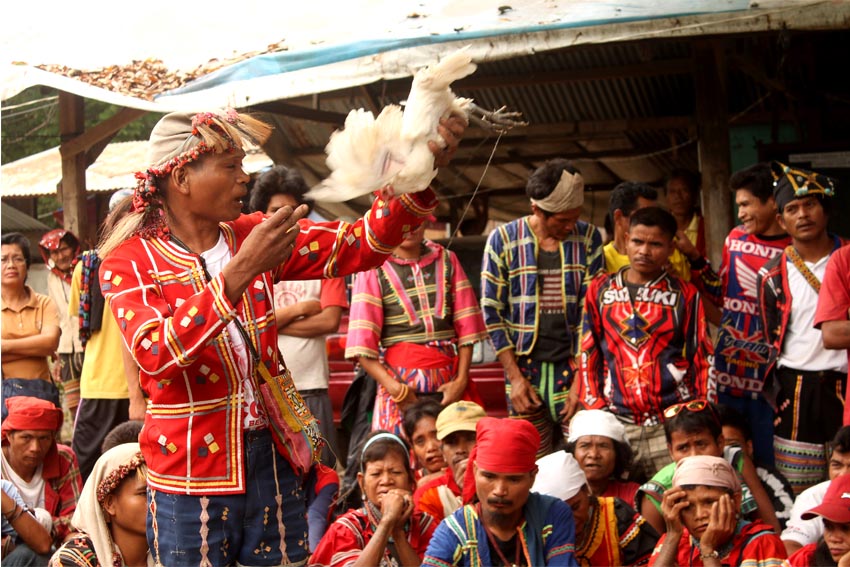
The Panubad-tubad
Panubad-tubad is the general Manobo term for a ritual or prayer. These Talaingod Manobos are some of the least acculturated to so-called “lowland, Christian” culture, retaining their animist beliefs and indigenous worldviews. The panubad-tubad can be conducted by a single spiritual practitioner called a baylan, or by several of them. The reasons for performing a panubad-tubad are similar to the reasons for prayer in other faiths: to heal the sick, to ward off illness, to welcome visitors, and to bid travelers a safe journey.
The first panubad-tubad at the bakwit area was performed on the morning of 9 April 2014, before a contingent of the evacuees proceeded to Camp Panacan in Davao City, for a picket-protest against the military occupation of their communities.
Two prominent members of the community, the brothers Gombil and Ansag Mansimuy-at, performed the panubad-tubad; another brother, Tungi-ig, and a cousin, Teody, assisted them. The four men stand in the middle of a circle composed of their fellow lumads, those who were to join them at the picket protest. At their feet is a banana leaf where some betel chew has been prepared. There is also a white chicken called an ogis standing by.
The ogis is the panubad-tubad sacrifice, frequently a white-feathered male chicken, though at another occasion at the bakwit a red chicken was used, because, as the Manobos said, the color red symbolized strength. We should note here that this episode with the red chicken took place later during their stay in Haran, at a point when the Manobos perhaps felt that their strength to sustain themselves was close to running out.
Gombil is the first to speak. Standing before the betel chew and banana leaf, and clutching the white chicken, he says his prayer aloud, strong enough for all those present to hear. He begins by characterizing the present struggle of his people as a defense of their yutang kabilin or ancestral land, and emphasizing the interconnectedness of all collective entities: in the mountains and in the lowlands, the non-lumad support groups and the unity they have entered into. His prayer is brief, and when he finishes he passes the white chicken on to Ansag, who, in turn, also clutches the chicken as he intones his panubad-tubad.
Ansag begins his panubad-tubad by invoking a mother and a father figure. The mother figure, which is first invoked, has no proper name, being called upon by the generic term inayon. The father figure is named Magbabaya, the male creator-being commonly recognized in many Manobo sub-groups. Magbabaya is responsible for creating all things seen and unseen, including the other unseen elements mentioned further in this panubad-tubad. The mother figure is called upon to for her protection, while the father figure is called upon to bestow some sort of triumphant justice, for the Manobos were not those who “[took] by force the land of others”.
After entreating the parent-figures, Ansag calls upon a collective of spirits called taharayuhan, not so much to petition them, but to somehow admonish them. Ansag tells the taharahuyan that they must act to keep the mountains safe; for they too will be harmed should anything happen to their domain. This treatment of the taharayuhan is interesting for taharayuhans are considered malignant spirits that dwell in balete trees. They could send illnesses should they choose, the cure for which would be the sacrifice of an ogis. But in this case, a fearless Ansag forcefully persuades them to unite with the Manobos for a common cause.
Ansag next calls upon Mandalangan, another deity in the pantheon of Manobos. Mandalangan is responsible for bestowing strength and courage, especially upon baganis or warriors before they launch a pangayaw or their traditional form of warfare. Because of this the Mandalangan is commonly described as a war god, and it is notable that in this prayer his name is mentioned not in association with launching a pangayaw, but to ask for additional protection. This shift is reinforced further by Ansag’s following lines – presenting the ogis, Ansag says that they “want only goodness, not strife”.
More in line with the functions of Mandalangan is the mention of the pakuid, and the Manobos’ wish for it not to draw near. The pakuid are spirits that dwell in the heavens that bring turmoil and trouble, both in the minds of individuals and in their relations with other people. It must be noted at this point that prior to the arrival of the Spaniards, no heaven=goodness/earth=evil correlation existed in Filipino cosmology; spirits that are good, or evil, or somewhere in between could reside anywhere. Thus, Ansag bids the pakuid to “alight” not among his people, but among those that deserve it.
How does the pakuid operate? Persons upon which the pakuid alights, or mapakuiran, are assailed by feelings of internal chaos and paranoia to the point of being murderous. Common examples of mapakuiran concern domestic matters, of partners driven to killing each other because of sexual jealousy or irresolvable differences. Uncontrolled pakuid can render one unable to recognize friend or foe when in the grip of a rage, but prayers by warriors prior to a pangayaw can make the pakuid serve as a guide to ensure that their wrath is directed to their true enemies, and to prevent them from accidentally killing their comrades.
In the case of this panubad-tubad, Ansag, perhaps in a bid to play safe, bids the pakuid to land far away, at the edges of their world, or among “those who do not defend their land”. This is further emphasis that they are in the right, for all that they do is in defense of the land that is their “only source of life”.
Up to this point the panubad-tubad has consisted only of verbal expressions with little utilization of physical actions or the surrounding space. But no panubad-tubad is complete without the pakulab, or the ritual gesture of stretching one wing of the chicken open and swinging the animal in a certain direction. The effect is a directed flapping of the chicken’s wing that coincides with the direction being mentioned at that moment by the baylan.
Ansag performs the pakulab thrice: the first is towards the direction of those about to join the picket-protest for their safety, the second is to the east, and the third is to the west. The first pakulab, directed towards the participants, is done while calling on the palapo. The palapo for the Talaingod Manobos is a generic term for “the owner of the chicken”, a seemingly innocuous designation for us but a weighty one among a people for whom the chicken is a highly regarded animal.
During the course of our study we made an inventory of the animals that the evacuees had brought over from their homes to Davao City. An inordinately high number were chickens, and we soon found out that it wasn’t just a matter of chickens being economically important or easy to handle during journeys. Many of our Talaingod Manobo informants tell us that one needs to always have a chicken when embarking on an important trip. Failure to do so can result in illness for both the person and his chicken, wherever it might have been left. They tell us that if a person dreams of a chicken, this was the palapo’s bidding that that he or she must find a chicken to take care of; failure to do so, or failure to take proper care of the chicken (which is now considered to be placed under one’s care by the palapo itself), can result in illness. This correspondence of owner and the owned, and the relationship of responsibility that exists between both (perhaps we can stretch this further to include the protectiveness of a hen towards its chicks?) is maybe what is echoed when Ansag tells the palapo to “protect [them] as [they] leave”.
Ansag next pakulabs to the east, associated with the rising sun, the rising of all that is good, especially the triumph they are most awaiting. The last pakulab is to the west, associated with sinking, something they wish upon their adversaries as embodied in the eye of the busaw.
The busaw is commonly (and quite simplistically) translated as evil spirits, but its meaning goes deeper than this if interrogated further. Busaw, as the older folk would explain, is more aptly translated as a strong power, to the point that it terrifies, which is probably why it can easily be associated with malevolence. Two ethnographic instances illustrate this. Very strong baylan earn the title dakel busaw, which literally means big busaw. At a previous fieldwork, when one Manobo elder saw a digital camera, he remarked that the device must have some kind of busaw in it. Hence, as power per se, the proper feel for this indigenous sense that they call busaw is neither immediately good nor evil, but more akin to the intense awe one feels when confronted with the unknown (like new technology such as the digital camera), or the inscrutable (such as the dakel busaw), and one is at the juncture of being unable to decide if such a confrontation is good or bad.
Perhaps the spontaneous desire to classify concepts as either good or evil is more a legacy of Christianity than of our pre-Hispanic ancestors. The latter must then be the more proper way of looking at Ansag’s formulation of his pakulab to the west: it is insufferable for the eye of such an intense power to be staring down on him and his people; it must be shut, sunk, but not necessarily (because power cannot be) destroyed.
As Ansag was about to end his prayer, his other brother Tung-ig quickly whispers a few words in his ear, reminding him that two women had given birth on the way down to Davao City. For the Talaingod Manobos, someone dying or giving birth while travelling is bad fortune. Such an event would normally signal the turning back of the entire party, something that had been impossible as they were fleeing the military.
This event is what Ansag refers to when he describes the heavens turning red as they fled their homes. He also uses the blood flow of childbirth as a metaphor, saying that the flowing blood will drown instead those who have treated them cruelly, making exact mention of the soldiers who made them suffer.
The sacrifice of the ogis signals the close of the panubad-tubad. The four men squat down over the betel chew. Ansag continues to hold the chicken as Gombil takes a knife and slices the chicken across the middle of its head, where its ear is located. Gombil later explains that the cut was made at that particular spot because they wish for their prayer to be “heard”. Blood drips on to the betel chew, Ansag immediately lets go of the chicken and everybody stands back from it as it flails around in its death throes.
Bloodletting is an important, though not necessary, part of a panubad-tubad. To remove unpleasant conditions, illness, or to ensure success in the face of great risk, the ogis must be bled. However, there are some panubad-tubad that are smaller in scale in terms of number of participants, or made under less urgent circumstances, that does not require the killing of the ogis. In the event that a pig is available, a chicken is still required to accomplish the pakulab, but the pig may be the actual animal killed.
Gombil then says the final words of the panubad-tubad, telling all present that the entire world will hear that they have taken their stand.
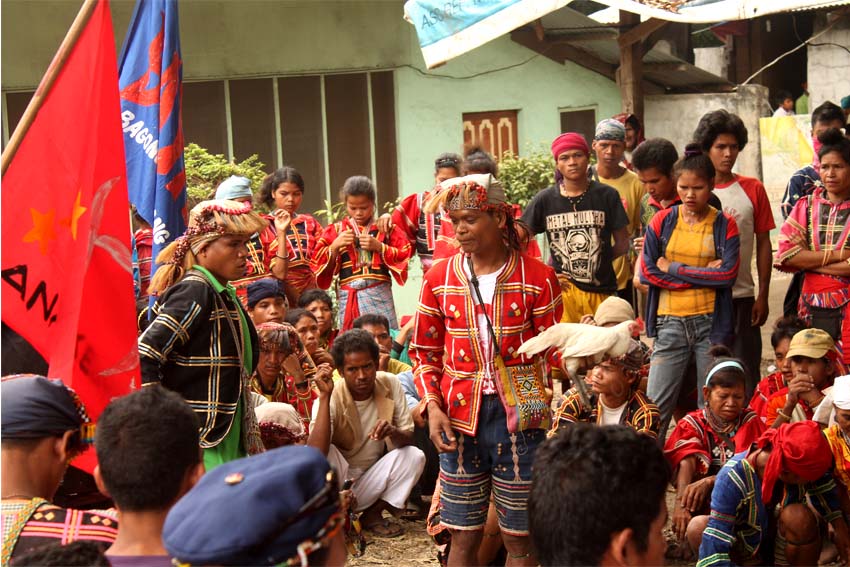
Two brothers, one prayer
Aside from the pakulab and the frequent, though not necessary, sacrificing of the ogis, there are no set words or actions for the Manobo panubad-tubad. Thus it is safe to say that each panubad-tubad, though all framed within a single cosmology, could be particular to the circumstances of the ritual as well as allowing the individuality of the baylan/s to shine through.
This is reflected in the prayers of the brothers Gombil and Ansag. The first part of the prayer, uttered by Gombil, is arguably more contemporary – as well as political – in flavor, with a mix of borrowed terms such as “yutang kabilin” (ancestral domain), as well as the inclusion of “suporta na grupo” (support groups) in his panubad-tubad’s petition. Ansag, meanwhile, uses more “traditional” terms and invocations, including calling individual deities and groups of spirits by name, and referring to phenomena that would only make sense within the Manobo worldview.
This distinction is also reflected in the personal background of the brothers. Gombil, the younger of the two, had been engaged with the “outside” world for longer, having been involved in political issues that have confronted the Talaingod Manobos through the years. Ansag, in the meantime, has cultivated a more inward-looking perspective, becoming a respected leader and hunter who knows the Pantaron like the back of his hand.
Nevertheless, these differing strains are united by a common theme: of triumphing – through struggle – in the defense of their ancestral domain, with this triumph defined as achieving a just peace.
The idea of triumph – wondrous, mirthful – is repeated again and again throughout the panubad-tubad. But this triumph is not easily won. The Talaingod Manobos know that there is an enemy to face, which is why they also repeatedly ask for protection – not just for themselves, but also those who support them – in what they know will be a battle.
A battle for what? For the Talaingod Manobos, this will be a defense of their ancestral domain, and a battle for the welfare of all those, both in the highlands and the lowlands, who could be adversely affected. This is in contrast to the soldiers, the “foreigners” or outsiders who made them suffer by taking their land by force away from them.
Their invocation of Mandalangan, the Manobo war god, to bestow peace instead of strife, and their wish to prevent the pakuid from drawing near are notable here. They recognize that in this battle, shedding blood may not be what primarily matters (perhaps because this seems to be more the domain of the invaders?), but more so the resumption of their interrupted lives and the reclaiming of their yutang kabilin. It is these that fill the Talaingod Manobos with the conviction that they are fighting a just struggle.
Learning to listen, learning to understand
Many of us perhaps still cannot shake off the feeling that these are a backward, superstitious, nature-sprit-loving people, probably because the majority of us grew up in fervently monotheistic households and communities that are also utterly convinced of the truth of their respective faiths.
But in a politically-correct and supposedly tolerant society we are also obliged to treat them, at the minimum, with respect, to “live and let live”, as they say. But, if we simply “lived and let live”, can we genuinely listen to and understand their words?
This is what the team realized when we tried to make sense of some of the more difficult, or “conceptually-heavy” passages of the panubad-tubad. These would revolve around gods and spirits in their pantheon. The approach we saw to be most appropriate was to consider these to be personifications of concepts that are actually present in many other cultures: pakuid as jealousy and blind rage, taharayuhan as akin to our own ideas of ecology, Mandalangan as defense and vengeance, and so on.
All cultures are faced with the challenge of defining and dealing with feelings, concepts, ideas. Socrates chose to explore justice in its abstract form. Our Talaingod Manobos chose to personify them, and as such, relate to them as one would relate to other persons: they can be entreated, persuaded, scolded, even. This may be a different approach to philosophizing from what we have learned in the university, but nevertheless, the essential ingredients in how to make sense of the world, present phenomena, and potential futures are all here.
Today, as they rebuild their lives they will no doubt continue to wrestle with the pakuid and the palapo, with Magbabaya and Mandalangan, as we here in the lowlands wrestle with nationalism, armed struggle, and social justice in our common journey to imagine in our minds and create with our hands a truly better society. (davatoday.com)
Transcription and Translation
| Talaingod/Pantaron Manobo | Cebuano | Tagalog | English Translations |
|
(Panubadtubad of Gombil Mansimuy-at) 1. Soin su kanamin pagpaningkamot. Kokon noy-o ug barugan ka yutang kabilin, konon kanami ru kaapektuhan … |
Kini ang among paningkamot. Kung dili namo barugan ang yutang kabilin, dili lang kami ang maapektuhan … Ito ang aming pagsisikap. Kung hindi namin panindigan ang lupang minana, hindi lang kami ang maapektuhan … This is what we strive for. If we don’t defend our ancestral land, we won’t be the only ones to suffer… |
| 2. … kokono apila ka kayt kabubunga, kayt kapatagan kaapektuhan, pananglit kukoy ug pagkapugong tu yutang kabilin. |
… kun dili apil ang naa sa kabukiran ug kapatagan, pananglit dili namo pugngan [nga mabawi] ang yutang kabilin. … kundi kasama na ang mga nariyan sa kabundukan at kapatagan, sakaling hindi pinigilan [na maagaw] ang lupang minana. … those in the mountains and the lowlands will suffer as well, if ever we let go of our land. |
| 3. Suys kanamin pagtubad kaniyo ka nigduma kanami, tibuok sois kanamin suporta na grupo, tanan ug kasuportahan, … |
Kini among pag-ampo sa inyuha nga nag-uban sa amoa, [nga ang] tanang suportang grupo, tanan masuportahan, … Ito ang aming panalangin sa inyo na sumasama sa amin, [na ang] lahat na suportang grupo, lahat ay masuportahan, … This we pray to you, our companions, that all support groups, may they be supported… |
| 4. …warug pagkasikwahi tu baruganan, kuntuo tu pagipanow nuy. |
…walay musimang sa baruganan, karon sa paglakaw namo. …walang liliko ng paninindigan, ngayon sa aming paglisan. …let no one break from our unity, now as we leave. |
| 5. Sika kuntuo, kara kog dokowg loku, kanig tanudtanud kanami. |
Mao karon, ayaw mi biyai, kamo nga naghunahuna kanamo. Kaya ngayon, huwag nyo kaming iwanan, kayo na umaalala sa amin. So now, do not leave us, you who watch over us. |
|
(Panubadtubad of Ansag Mansimuy-at) 6. Kaniyo inayon kagpitaw kag tangkis, konoy ko kabayaan nuy. |
Kamo nga inahan namo, tagtan-aw ug tag-sagang, walay makalusot [na katalagman sa among dalan]. Kayo na aming ina, tagabantay at tagasalo, walang makalulusot [na sakuna sa aming daan]. You, our mother, our guardian, and our shield, because of you, no danger will come to pass. |
| 7. Sini kuntuo no masulum ug panubadtubad nuy. |
Kini karon na buntag mag-ampo mi. Ngayong araw ay manalangin kami. Today we pray. |
| 8. Keykow su amoy nuy Magbabaya nug pitaw kanami. |
Ikaw ang amahan namo na Magbabaya nga naglantaw sa amoa. Ikaw ang ama namin na Magbabaya na tumatanaw sa amin. You our father, Magbabaya, who watches over us. |
| 9. Konog kaupii nuy nu duog kasalagbuan nuy nu maroot. |
Dili namo gusto na kami makatagbo sa dautan. Ayaw namin na kami ay makatagpo ng kasamaan. We do not wish to encounter evil. |
| 10. Iyan nuy ig kaupii nu si kanami ug pakadaog kuy dugma kuntuo. |
Among gusto nga makadaog pud mi karon. Gusto namin na magwagi rin kami ngayon. What we wish now is to triumph instead. |
| 11. Sus kanami waru kuy nangilog tu lain na nasud. |
Kay kami wala mi nangilog sa lain nga nasod. Dahil hindi kami nanghimasok sa ibang bansa. For we did not take by force the land of others. |
| 12. Kaniyo kuntuo suini su mo taharayuhan… |
Kamo karon na mga taharayuhan… Kayo ngayon na mga taharayuhan… You, now, the taharayuhans… |
| 13. …nu ampingi kay, su ontow kuntuo kaapektuhan ko mabungkag ini su Pantaron, kaniyok mutaharayuhan. |
…ampingi ni, kay kinsa karon ang maapektuhan kun mabungkag ning Pantaron? Kamo nga mga taharayuhan. …ingatan nyo ito, dahil sino ba ang maapektuhan kung masisira ang Pantaron. Kayo na mga taharayuhan. …you must keep it safe, for who else will be affected if Pantaron is destroyed, but you, taharayuhan? |
| 14. Ikan iya kuntuo si kanami kuntuo so ini ugomow koy kuntuo to kanami nu Mandalangan. |
Mao karon, kami mutawag sa among Mandalangan. Kaya ngayon, tatawag kami sa aming Mandalangan. So now, we call upon our Mandalangan.
|
| 15. Layon koy bantayi kagipanow. |
Padayon nga paglantaw sa among paglakaw. Patuloy kaming bantayan sa aming paglisan. Continue to guard us as we leave. |
| 16. Iyan nuy kuntuo nigpurot sois ogis, kay koyt kaupiyanan, kukoy gustot kasamok. |
Mao karon, nagdala mi aning ogis nga manuk, kay kaayuhan ang gusto namo, dili namo gusto sa kasamok. Kaya ngayon, narito ang ogis, dahil kabutihan ang layon namin, ayaw namin ng gulo. This is why, here is the ogis; we want only goodness, not strife. |
| 17. Igkaupii ko nu sikoykow ka amamangkil pangkilanu su pakalungod kanami nu pakuid. |
Gusto nako nga ikaw ang tigsagang aron dili makaduol ang pakuid. Gusto ko na ikaw ang sasalo upang hindi makalapit ang pakuid. It is our wish for you to prevent the pakuid from drawing near. |
| 18. Diyo makaruug tu ilis su pakuid.Kono koy marauhi, kanig barug ta tanu. Iya marauhian ka waru nakabarug tu kandin nu tanu. |
Didto makatugpa sa daplin ang pakuid. Dili mi matugpahan, kami nga nagbarog sa yuta. Ang matugpahan ang wala nagbarog sa ilang yuta. Doon dadapo sa kagiliran ang pakuid. Hindi dadapo doon sa mga nanindigan sa kanilang lupain. Dadapo ito doon sa mga walang paninindigan sa kanilang lupain. The pakuid will alight at the edges of our world. It will not alight among those who defend their land. The pakuid will alight instead among those who do not defend their land. |
| 19. So soin du iya kain kabuhi nuy nu tanu. |
Kay mao lang ni ang among gikabuhian nga yuta. Dahil ito lang ang ikinabubuhay naming lupain. For this land is our only source of life. |
| 20. Si kanya kuntuo igparahas ko sois tubaran ko. |
Mao kini karon ipadayon nako kining tubad nako. Kaya ipagpatuloy ko ang aking panalangin. Thus, I will continue my prayer. |
| 21. Pakulaban ko su ini tanan su nu ug-ga-rali wa naa kuntuo ug kasalagbuan nuy. |
Akong pakulaban ang tanan na mag-rali aron walay muabot nga katalagman… Pakulaban ko ang lahat na magra-rali ngayon upang walang darating na sakuna… I will pakulab all who will join the rally so that no misfortune befalls them… |
| 22. …tugipanow su koykow ka palapu, du kag awoy kag babantuy kanami tu gipanow. |
…sa paglakaw, kay ikaw ang palapo, ayaw mig kalimti, ang nagbantay kanamo sa paglakaw. …sa aming paglakad, dahil ikaw ang palapo, huwag kaming kalimutan, ang nagbabantay sa aming paglisan. …as they walk, for you are the palapo, don’t forget us, you who protect us as we leave. |
| 23. Amag dug pakaatubang koy tu kalaban nuy waru ug kasalagbuan nuy. |
Bisan pag mag-atubang sa kaaway, walay mahiagom sa katalagman. Kahit pa haharap sa kalaban, walang malalagay sa sakuna. Although we face the enemy, no harm will come. |
| 24. Igpakulab ko dini igsilo, nu unduut ugsilo kakahalawan nuy tug manliliyag kuy tu mariyow na aldaw nakadaug koy. |
Ipakulab ko sa sidlakan, murag musidlak ang kalipay sa maayong adlaw nga makadaug kami. Ipakulab ko sa silangan, parang sisilang ang kasiyahan sa magandang araw na magtatagumpay kami. I will pakulab to the east, mirth and the wondrous day of our triumph will arise. |
| 25. Igpakulab ko dini iglinub, unduut uglinub ka matakbusaw nug pipitow kanami. |
Ipakulab ko sa kasadpan/kasawpan {ka-salop/sawop-an}, murag musalop ang mata sa busow nga nagtan-aw kanamo. Ipakulab ko sa kanluran, parang lulubog ang mata ng busaw na tumitingin sa amin. I will pakulab to the west, the eye of the busaw that is upon us sinks. |
| 26. Amagdus namalawagan kan ligkat diyo tu kanamin ugpaan, naruug katuupan kuntuo tu ga-rali kuy… |
Bisan tuod na namalawagan ang puy-anan nga among gigikanan, hinaot nga walay mahitabo sa mga naga-rali. Kahit pa namalawagan ang tirahang aming pinanggalingan, sanay palaging ligtas ang mga magra-rali. Although the heavens turned red as we fled our homes, from whence we came, may we always be safe, us who will go to the rally. |
| 27. Palaspasonku nu mapalaspas karoot nun palongod kanami. |
Akong ipalaspas aron walay makaduol sa amo nga dautan. Ipalaspas ko ito upang walang makalapit na masama. I wave this over you so that no harm will draw near. |
| 28. Amagdus duo niglasutan kayt dalan, iyag kaanas tulangosa iyag kaanas tu langosaka sundalo nugdaugdaug kanami, nu iyag ka-anas ka langyaw nugdaugdaug kanami. |
Bisan tuod nga naay nanganak sa dalan, walay malumos sa dugo. Ang maanod sa dugo kanang mga sundalo nga nagdaogdaog sa amoa, ang maanod ang langyaw nga nagdaogdaog kanamo. Kahit may nanganak sa daan, walang babahang dugo. Ang aanurin ng dugo ay ang mga sundalong nagpapahirap sa amin, malulunod ang mga banyagang nagpapahirap sa amin. Although someone gave birth along the way, the blood will not flood us. Those that will be flooded are the soldiers who treated us cruelly, they will drown, those foreigners who made us suffer. |
| 29. Igpu-niyog ko inyug ka ka maruot ig patangku ko no iyang tangku ka mariyow pisang kuktalinga, nun tatalinga tuk kanami nakabarug. |
Ipatalikod ang mga dautan, muatubang sa amoa ang maayo. Bisan asang mga tao, sila makadunog nga kami nakigbisog. Ipatalikud ang masama, ipaharap sa amin ang kabutihan. Kahit saang dako, sila’y makakarinig na kami ay naninindigan. Evil will turn away, goodness will face us. Throughout the world, they will hear that we have taken our stand. |

